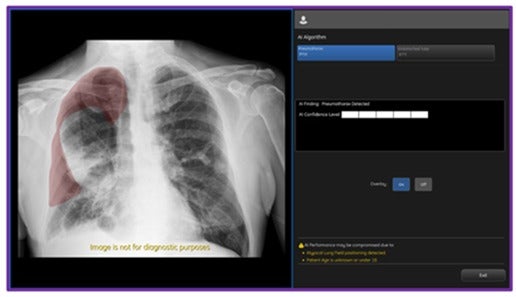
US-based medical technology firm GE HealthCare has secured the US Food and Drug Administration (FDA) 510(k) approval for its Critical Care Suite 2.1 with a Pneumothorax (PTX) algorithm.
The algorithm, which is designed to detect, notify, triage, and diagnose PTX, is expected to expand the Critical Care Suite’s on-device triage capabilities.
It enables the Critical Care Suite 2.1 to provide immediate on-device detection and triage notifications for the presence or absence of PTX.
Upon detecting PTX, the system displays an overlay in the area where the PTX was located both on-device and in PACS to support the PTX localisation and improve PTX diagnosis.
The Critical Care Suite with PTX algorithm also provides critical insights at the point of care and across the entire clinical care team, said the medical technology company.
GE HealthCare women’s health and x-ray president and CEO Jyoti Gupta said: “Artificial intelligence applications in healthcare continue to prove their value in clinical practice and on the frontlines of patient care.
“The adoption of these digital solutions helps unlock efficiencies across the entire clinical workflow and empowers radiologists and their teams in making critical decisions with confidence in time-sensitive situations.
“We are excited by the paradigm shift this kind of innovation can bring in the delivery of timely and efficient patient care, enabling enhanced clinical outcomes when it matters most.”
The PTX algorithm operates with a high degree of accuracy, where it partially localises 100% of all detected large PTXs and 96% of all detected small PTXs while limiting false alerts.
Also, the technology showed several benefits in clinical studies, including a 57% reduction in reporting times for actionable PTXs and a 17.7% increase in clinician detection of small PTXs.
The Critical Care Suite has been co-developed by GE HealthCare and UCSF’s Centre for Digital Health Innovation (CDHI).
The advanced AI algorithm was trained using a large, diverse data set comprising more than 30,000 images from multiple countries and institutions, said GE HealthCare.
University Hospitals of Cleveland cardiothoracic imaging division chief Amit Gupta said: “The ultimate journey for an AI tool from bench to bedside is when you involve the entire clinical team, including bedside Physicians, Nurse Practitioners and Radiologists.
“GE HealthCare’s innovation with Critical Care Suite to have alerts on mobile systems is helping clinicians make decisions with confidence in these critical moments.”






